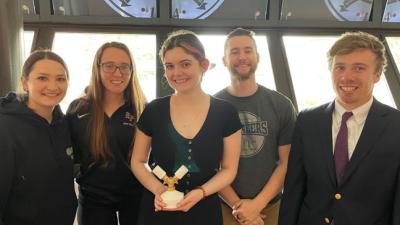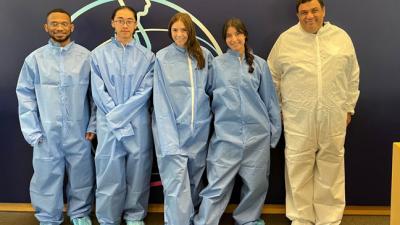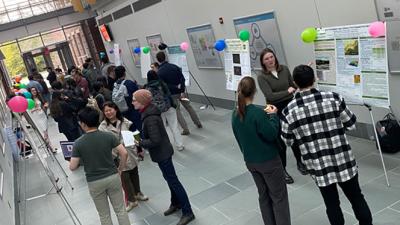BME News
Rensselaer Polytechnic Institute (RPI) has received a $10 million gift from Ajit Prabhu ’98, founder and CEO of Quest Global, to establish the Ajit Prabhu Catalyst Endowment and the Ajit Prabhu Catalyst Fund, both in support of the Office of Strategic Alliances and Translation (OSAT). Prabhu launched the fund, which will assist RPI student and faculty entrepreneurs.
Rensselaer Polytechnic Institute (RPI) is proud to announce that Pingkun Yan, Ph.D., associate professor of Biomedical Engineering at RPI, has been appointed chair of the IEEE Engineering in Medicine and Biology Society (EMBS) Technical Committee on Biomedical Imaging and Image Processing (BIIP).
Lung cancer is one of the most challenging diseases, making early diagnosis crucial for effective treatment. Fortunately, advancements in artificial intelligence (AI) are transforming lung cancer screening, improving both accuracy and efficiency.
Ge Wang, the Clark-Crossan Chaired Professor and director of the Biomedical Imaging Center at Rensselaer Polytechnic Institute (RPI), has been appointed as the editor-in-chief of the IEEE Transactions on Medical Imaging journal. With nearly 3,000 submissions per year, it is the flagship journal in the tomographic medical imaging field and among the most highly cited of all biomedical engineering journals. Wang’s initial term is for three years and is renewable for a second term.
Juergen Hahn, Ph.D., professor and head of the Department of Biomedical Engineering at Rensselaer Polytechnic Institute (RPI), has been elected to the prestigious European Academy of Sciences and Arts for his outstanding and sustained impact on science and society. He will be formally inducted into the organization in 2025.
The Department of Biomedical Engineering at Rensselaer Polytechnic Institute has established a new master’s degree program that will prepare students for careers of biomedical data science, a fast growing engineering specialty.Those with expertise in biomedical data science are already in high demand, and that demand will continue to rise in the future, said Juergen Hahn, Ph.D., head of the Biomedical Engineering Department.
Six RPI students have been awarded fellowships from the National Science Foundation’s Graduate Research Fellowship Program (GRFP).
Joan Llabre, Ph.D. '23, who received her doctorate in biomedical engineering from Rensselaer Polytechnic Institute this past fall and is now a postdoctoral researcher at the Institute, has won the Koerner Family Foundation Fellowship, which supports engineers pursuing careers in research.
Using artificial intelligence tools to analyze years of biomedical data, researchers at Rensselaer Polytechnic Institute have discovered a possible connection between sleep, gastrointestinal health, and two potentially harmful behaviors often associated with profound autism: self-injury and aggression. Their study is published in the Journal of Personalized Medicine.
This spring, a team of biomedical engineering students at Rensselaer Polytechnic Institute helped create a critical component that may be used to diagnose skin cancer rapidly and at the point of care, pending FDA clearance.
Rensselaer Polytechnic Institute has established the Office of Strategic Alliances and Translation, a new area within the university that incorporates a number of key translational activities at RPI, including intellectual property and technology licensing, large-scale corporate partnerships, initiation and growth of start-up ventures, and translational campuses, including the Rensselaer Technology Park, as well as translational activities in New York City.
This past summer, a team of Rensselaer Polytechnic Institute students, with the guidance of a faculty mentor, pitched a winning design for a wearable, medical-grade device that monitors for atrial fibrillation. Atrial fibrillation, or A-fib, is a potentially life-threatening heart condition that will affect an estimated 12 million people in the U.S. by 2030, according to the Centers for Disease Control and Prevention.
Researchers from Rensselaer Polytechnic Institute (RPI) and Albany Medical College were awarded a $3.3 million grant over five years by the National Cancer Institute to use artificial intelligence (AI) to improve targeted drug therapy in HER2-positive breast cancer treatment. HER2-positive breast cancer tends to grow and spread quickly, but targeted treatments improve outcomes.
High school students in upstate New York have their pick of colleges and universities within driving distance, and some choose to head to nearby states such as Massachusetts, Connecticut, Vermont, or New Hampshire. However, many students choose Rensselaer Polytechnic Institute (RPI), a technological research institution with a global reach that also happens to be local.
Recently, more than 30 undergraduate students from Rensselaer Polytechnic Institute gathered at the Center for Biotechnology and Interdisciplinary Studies to share their findings with the community.




 RPI Announces $10 Million Gift from Alumnus and Entrepreneur Ajit Prabhu
RPI Announces $10 Million Gift from Alumnus and Entrepreneur Ajit Prabhu
 RPI Professor Appointed Chair of IEEE Biomedical Imaging and Image Processing Technical Committee
RPI Professor Appointed Chair of IEEE Biomedical Imaging and Image Processing Technical Committee
 Multimodal Multitask Foundation Model Enhances Lung Cancer Screening and Beyond
Multimodal Multitask Foundation Model Enhances Lung Cancer Screening and Beyond
 Ge Wang Named Editor-in-Chief of IEEE Transactions on Medical Imaging
Ge Wang Named Editor-in-Chief of IEEE Transactions on Medical Imaging
 RPI Autism Researcher Juergen Hahn Elected to European Academy of Sciences and Arts
RPI Autism Researcher Juergen Hahn Elected to European Academy of Sciences and Arts
 RPI’s New Master of Biomedical Engineering Data Science Readies Students for Careers in Health Sciences, Clinical Research, and more
RPI’s New Master of Biomedical Engineering Data Science Readies Students for Careers in Health Sciences, Clinical Research, and more
 Six RPI Students Receive Prestigious NSF Graduate Research Fellowships
Six RPI Students Receive Prestigious NSF Graduate Research Fellowships
 RPI Grad, Now Postdoc, Wins Prestigious Koerner Family Foundation Fellowship
RPI Grad, Now Postdoc, Wins Prestigious Koerner Family Foundation Fellowship
 Researchers Use AI To Predict Challenging Behaviors Common in Profound Autism
Researchers Use AI To Predict Challenging Behaviors Common in Profound Autism
 Rensselaer Students Help Revolutionize Skin Cancer Diagnostics
Rensselaer Students Help Revolutionize Skin Cancer Diagnostics
 RPI Creates Office of Strategic Alliances and Translation
RPI Creates Office of Strategic Alliances and Translation
 Rensselaer Students Win National Competition for Heart Monitoring Device Design
Rensselaer Students Win National Competition for Heart Monitoring Device Design
 RPI and Albany Medical College Researchers Awarded $3.3 Million To Improve Breast Cancer Treatment Using Artificial Intelligence
RPI and Albany Medical College Researchers Awarded $3.3 Million To Improve Breast Cancer Treatment Using Artificial Intelligence
 From ‘engineer’ To Engineer: Local Students Graduate From RPI
From ‘engineer’ To Engineer: Local Students Graduate From RPI
 Undergraduate Students Present Their Research
Undergraduate Students Present Their Research